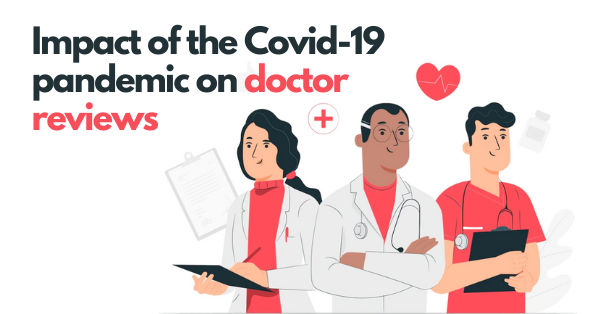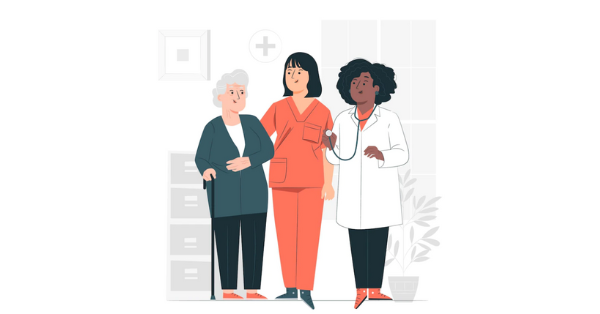Finding and choosing a new doctor can be a nerve-wracking task. People usually rely on friends' recommendations, but thanks to the Internet, lots of information can be found online.
Online reviews are often the deciding factor when buying different products, so the field of medicine is no exception. Doctor reviews are one of the most searched terms on the Internet, and Covid-19 certainly contributed to this trend.

Why doctor reviews are important?
When deciding on a particular product or service, you probably pay attention to several factors. However, if we were to ask you to single out just one, it would probably be transparency.
There is no area where transparency is more important than in healthcare. No one will entrust their health, or that of their family member, to someone who is unreliable. If we add to that the fact that health services are often not free, it’s clear that there is no shortage of reasons for caution.
That’s where doctor reviews come into play.
If there are doctors among you, you’ll probably say that reviewing in the healthcare industry is much more complex compared to other products and services. That's true, but the patient has to start somewhere, right? Perhaps online doctor reviews will not provide the patient with the most detailed information, but they’ll help him gain quite good insights into what the general opinion about a certain doctor or institution is. Enough to decide whether to call you and make an appointment or not.
Studies have shown that doctors individually have around 3 to 5 reviews. A small number, right? That’s definitely not enough to make a certain decision. So, why doctor reviews are so important?
Let’s think about this a bit.
What is being reviewed?
Have you ever left a review when your level of satisfaction was as expected, around average? Probably not. That’s because people tend to leave reviews when their experience is highly above or below the expected. If a doctor did that one extra step, patients will certainly be willing to praise him/her online and among their friends. The same goes if they had an unpleasant experience.
Also, different people comment on different things. Some patients will share a more general impression, while others focus more on the doctor’s competence. It’s also important to note that patient reviews sometimes go beyond the doctor itself and focus more on the staff, office, or appointments.

Although doctors cannot influence all of this, it is important to know what the general opinion is and whether any of these segments can be improved.
Do people believe in online reviews of doctors?
Over the years, people have learned to take what they see on the Internet with a grain of salt. Not everything is true, and people usually can recognize when there is a scam. For example, if a doctor or a healthcare institution has all extremely positive or negative reviews, it’s usually a sign to double-check it.
But, do people, in general, believe online doctor reviews? NRChealth research results would say very much so. 34.7% of patients find doctors' online reputation very important, and 59.9% have selected their doctor based on online reviews! Even more important, 60.8% of patients avoided certain doctors based on their negative online reviews.
Therefore, patients definitely rely on doctor reviews when doing their investigation process. This is supported by the fact that 37% of patients start their search for a new doctor on the Internet. Also, 20.8% of patients tend to double-check their family or friends' recommendations on the Internet!
It’s worth mentioning that patients also expect feedback. Whether it’s a reply in the comment, scheduling an appointment, a call, or even some bigger organizational changes. If for instance, many patients find your appointment scheduling system too complicated or slow, they would expect you to organize it more efficiently.
Okay, so people, in general, do believe in doctor reviews. But, is this primarily an effect of Covid-19?
Has Covid-19 changed the situation?
The Internet wields a massive influence on choices that people make on a daily basis. Additionally, the pandemic has only increased this influence, and the medical industry is no exception.
Software advice did research on this topic in 2013, and then again in 2020 due to all that has happened in that year. The results are clear as day - back in 2013, only 25% of patients used online reviews to rate or find more information about a certain doctor. However, in 2020, this number increased to 47%!

It’s obvious that doctor reviews have become a trustworthy source of information.
If you think about it, these numbers are completely expected. Why? Simply because the pandemic was something completely new for everyone. Hence, recommendations from friends are no more reliable than recommendations that can be found online. People had different symptoms of infection, the course of the disease varied greatly, they had different experiences of treatment in hospitals, and divided opinions about vaccination.
Precisely because of this, the sample that was possible to find online was certainly larger than if the patient had inquired only among his circle of friends.
Where can doctor reviews be found?
It’s not just that patients are using and relying on reviews, but that doctor reviews are the first thing they see when searching for a doctor. You might be wondering how’s that possible.
Well, we as patients are not the only ones who think that reviews are important. Google thinks so too. Therefore, when positioning a website, Google’s Search Engine Optimization algorithm (SEO) heavily uses general content - such as reviews.
What does this mean for a doctor or an institution? It means that when a patient types the doctor’s name, the online reviews are what they will come across first.

If you are a doctor, we can already see all the alarms going off, and you’re probably wondering how you can control this. Where to find all those reviews? How to know if patients are leaving good or bad reviews across the Internet?
Yes, that’s a tough one.
But don't despair! Some regularities can still be observed. The largest number of patients look for and leave doctor reviews on Google. Besides using Google reviews, patients visit Healthgrades and Yelp the most. Therefore, in addition to the fact that you will take care of the reviews that patients leave on your site, these three sites are also a must-have.
How to proceed?
Okay, this news has calmed you down a bit, but now there's a new problem. In addition to all your workload, how can you follow what is happening on the Internet every day? You don't even have time to dedicate yourself to your website and social networks, let alone other places!
Don't worry, you are not the only one facing the same problem. Since a large number of businesses from different fields share the same concerns, online review aggregator tools have appeared on the market. These are tools that are able to scrape other websites and social media to capture customer reviews. In addition to being able to find them, these tools can also help you respond to comments, which would make your job much easier.
Bottom line
Like everything on the Internet, doctor reviews should be taken with a grain of salt. If you are a patient, it’s always important to get information from several sources before deciding on such an important decision. On the other hand, it should become completely clear to doctors how important and powerful online reviews are. The situation with the pandemic only confirmed that.
No business, including the one in the medical industry, can afford a bad reputation on the Internet.
